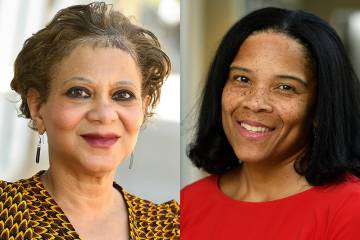A team of health equity experts from Johns Hopkins have joined a $50 million National Institutes of Health effort to close glaring gaps in the use of artificial intelligence and machine learning in health care and medicine among underrepresented communities.

Image caption: Tanjala Purnell, Casey Overby Taylor, and Roland J. Thorpe Jr.
Led by Roland J. Thorpe Jr., a Johns Hopkins Bloomberg School of Public Health professor and associate vice provost at the university, the Hopkins team will steer the northeast hub of the new NIH initiative, called the Artificial Intelligence/Machine Learning Consortium to Advance Health Equity and Researcher Diversity, or AIM-AHEAD.
The goal of AIM-AHEAD is to bring more diverse data and perspectives to building and testing AI and machine learning tools for health care and biomedical research, including those leveraging data sources such as electronic health records and remote patient monitoring devices.
Starting from the ground up, the effort aims to diversify the pool of researchers, community members, and key stakeholders working in the field, using new recruitment and training strategies. Across the country, the NIH program has enlisted numerous universities and experts in the areas of AI/machine learning, community engagement, health equity, data science, and data infrastructure.
"The gaps in diversity behind AI/ML development have been clear for some time, with very real consequences for public health and clinical settings," Thorpe says. "In order for these tools to work effectively and serve all communities, we first need to tackle the harmful biases that are shaping them."
Thorpe is serving as a principal investigator for the NIH consortium as well as leading the northeast hub, which also involves co-lead Tanjala Purnell, assistant professor of epidemiology at the Bloomberg School and director of education at the Brancati Center for the Advancement of Community Care, as well as co-investigator and data science expert Casey Overby Taylor, associate professor of medicine and biomedical engineering at the School of Medicine. As the two-year effort progresses, the Hopkins team will bring on additional researchers, community and health care organizations, and institutions across the region, including historically Black colleges and universities.
"We're focusing not only on how the technology is built, but who is building it," Purnell says. "A major goal of this initiative is to create networks and pipelines so more people of color have opportunities in these fields, which in turn can help develop more inclusive technologies."
"The more diversity we bring to the field, the more we can build trusted relationships with health disparities groups," Taylor says. "Doing this can lead to more diversity of data used in AI/ML research, and can help to achieve findings that are more reflective of, relevant and helpful to, everyone."
The AIM-AHEAD program also includes the University of North Texas Health Science Center, Meharry Medical College, University of Houston, University of California Los Angeles, University of Colorado, Vanderbilt University, and Washington State University, among other partners.
Posted in Health, University News
Tagged nih funding, health equity, roland thorpe, tanjala purnell, casey overby taylor








